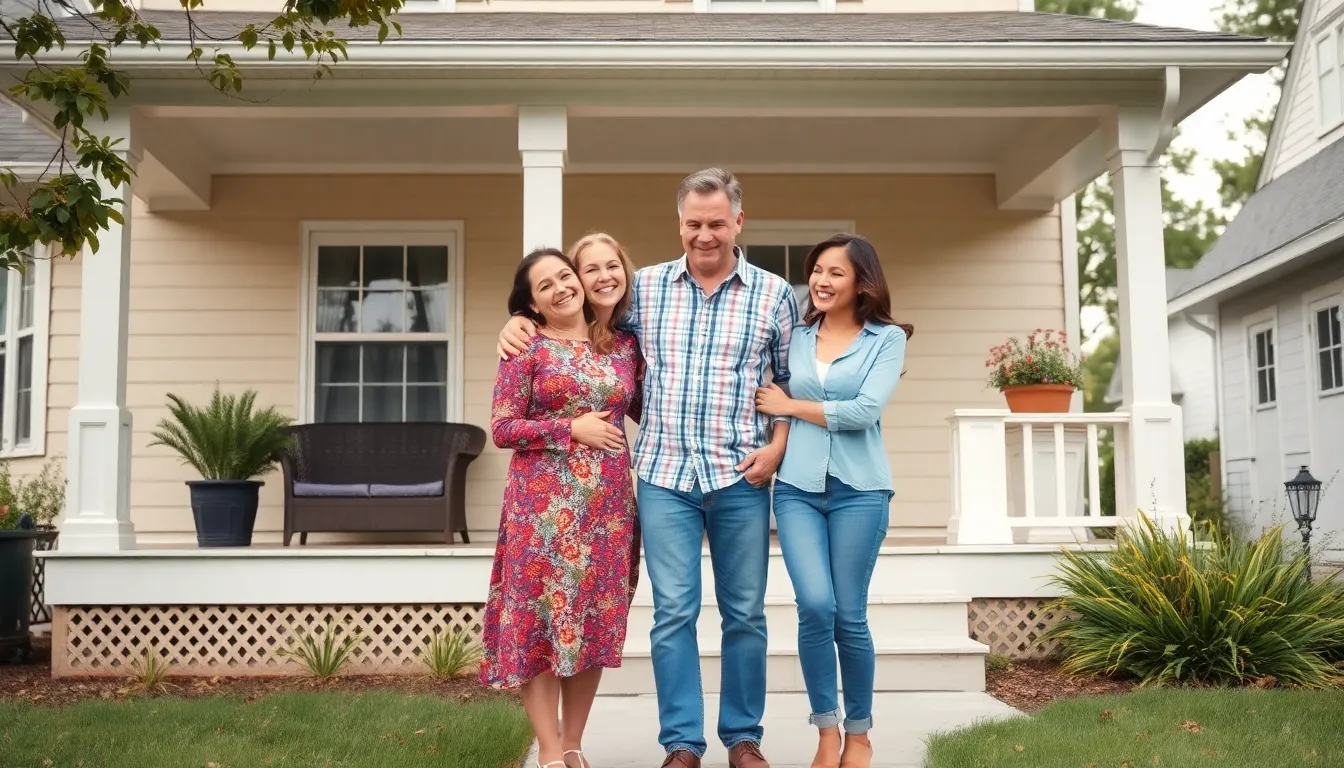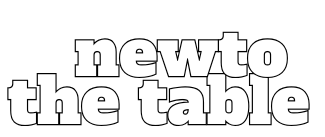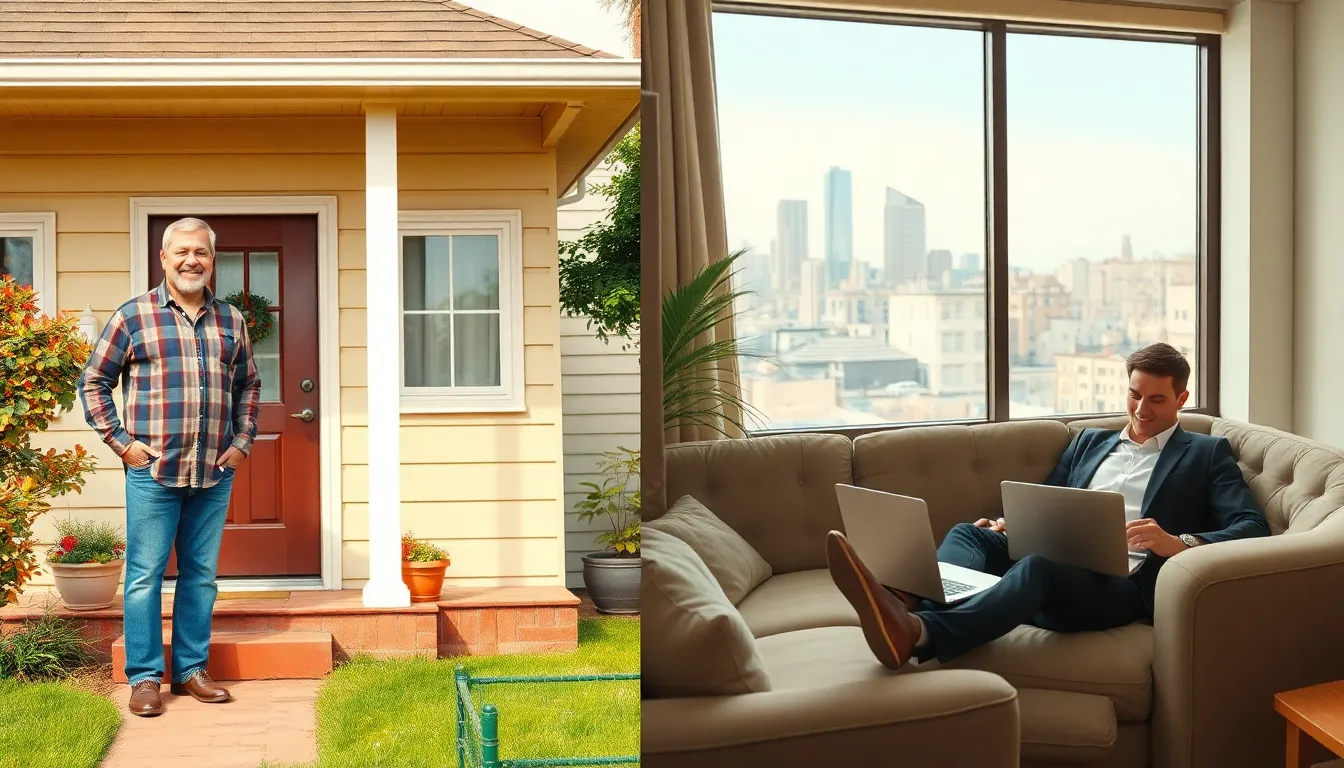In the great debate of owning versus renting, both sides have their champions. Picture this: on one hand, there’s the proud homeowner, sipping coffee in a house that’s all theirs, complete with a garden gnome collection. On the other, the savvy renter is free as a bird, dodging maintenance headaches and enjoying the flexibility of moving whenever they fancy.
Table of Contents
ToggleOverview of Owning vs Renting
Owning a home provides long-term stability and a sense of permanence. Homeowners build equity over time, allowing for financial benefits. Customization options offer a unique advantage. Individuals can modify their space according to personal taste and needs without asking for permission.
Renting appeals to many due to its flexibility. Renters enjoy the ability to move without a significant commitment. Financial responsibilities often remain lower, as they typically do not cover maintenance costs or property taxes. They can invest their capital elsewhere, possibly in more lucrative opportunities.
Each option presents unique challenges. Homeownership comes with upfront costs, including down payments and closing costs. Maintenance obligations can become burdensome over time, requiring significant time and financial investment. Furthermore, market fluctuations may impact home values.
Conversely, renters may face uncertainty regarding lease renewals and potential rent increases. They often lack the stability of fixed housing expenses. Limited control over property modifications can also be a downside. These factors contribute to diverse preferences among individuals.
Ultimately, an informed decision about owning versus renting depends on personal priorities and circumstances. Different life stages, financial goals, and lifestyle expectations influence the choice significantly. Both avenues offer distinct pros and cons, catering to varying needs and preferences in the housing market.
Pros of Owning a Home

Homeownership provides multiple advantages, attracting individuals seeking stability through property investment.
Building Equity
Owning a home allows individuals to build equity over time. Every mortgage payment contributes to ownership instead of rent payments that don’t result in asset accumulation. As property values appreciate, homeowners benefit from increased wealth. In fact, home equity often becomes a significant financial resource in retirement. The potential for accessing this equity through loans or lines of credit provides additional financial flexibility. Homeowners experience a return on investment as they pay down their mortgage, generating confidence in their financial future.
Stability and Control
Stability emerges as another key benefit of owning a home. Homeowners enjoy long-term living arrangements without the unpredictability of lease renewals and rental increases. Additionally, having control over property modifications enhances their living experience. Homeowners can personalize spaces according to their tastes without seeking landlord approval. This sense of control fosters a stronger emotional attachment to the property, making it feel like a true home. Consequently, they can invest in improvements that further enhance property value while creating a comfortable living environment.
Pros of Renting a Home
Renting a home offers various advantages, making it an appealing choice for many individuals. Flexibility and lower maintenance responsibilities stand out as key benefits.
Flexibility and Mobility
Renters enjoy significant flexibility. They can often choose lease terms that fit their lifestyle, whether that’s a short-term commitment or a longer stay. When life changes arise, relocating to new areas typically occurs more easily for renters. Moving a household generally incurs less hassle, while expenses like moving trucks are usually lower compared to buying a home. Many renters find themselves in ideal positions to explore different neighborhoods or cities without long-term commitment. This adaptability supports career changes, educational pursuits, or personal growth.
Lower Maintenance Responsibilities
Lower maintenance responsibilities mark another advantage of renting. Landlords often handle repair and upkeep tasks, allowing renters to focus on other priorities. In emergencies, such as plumbing issues or appliance failures, maintenance services help to ensure issues are resolved quickly. This support can lead to additional savings, as renters typically don’t bear the costs of significant repairs or home improvements. Avoiding summer yard work or winter snow shoveling further lets residents enjoy their living spaces with less work involved. Overall, renting fosters a carefree living environment that many individuals prioritize in their housing needs.
Economic Considerations
Economic factors play a crucial role in the decision to own or rent a home. Both options offer distinct advantages and challenges that can significantly impact financial well-being.
Comparing Costs
Examining the costs of ownership reveals substantial initial expenditures. Homebuyers face down payments, closing costs, and property taxes, which can reach thousands of dollars. In contrast, renting typically requires a security deposit and first month’s rent, lowering the barrier to entry. Monthly mortgage payments may be higher than rent, but they contribute to equity over time. Appreciation in property values can enhance a homeowner’s financial position as mortgage payments complete ownership. Renters benefit from predictable monthly expenses, but they build no equity. Weighing these factors helps clarify the financial implications of each choice.
Market Trends
Understanding market trends is vital for both renters and homeowners. Real estate markets often exhibit cyclical patterns, influencing property values and rental prices. When home prices rise, homeownership becomes more appealing for long-term wealth accumulation. Conversely, when rental rates increase, renters can seek more affordable options or different neighborhoods. Interest rates also impact the decision-making process; lower rates can make mortgages more attractive. Analyzing these trends aids individuals in making informed decisions based on current economic conditions and personal financial goals.
Lifestyle Implications
Owning a home offers specific lifestyle advantages, while renting brings its own unique set of benefits. These choices significantly impact daily living.
Investing in Personal Space
Homeownership allows individuals to customize their living environments. Owners can paint walls, remodel kitchens, and create gardens, reflecting personal tastes. Investing in property also builds equity over time, as each payment contributes to ownership. Equity increases a homeowner’s net worth, serving as a financial asset. Additionally, homeowners often enjoy tax benefits unavailable to renters, such as mortgage interest deductions. This potential for return on investment motivates many to choose homeownership over renting.
Community Engagement
Renters and homeowners engage with their communities differently. Homeowners tend to establish longer roots, fostering deeper relationships within their neighborhoods. They often participate in local events, volunteer opportunities, and community planning meetings. This engagement strengthens community ties and enhances their living experience. Renters benefit from the flexibility to move as opportunities arise, exploring new neighborhoods and communities. However, some might miss the stability that fosters lasting connections. Overall, the choice between renting and owning shapes not just living arrangements but also social involvement.
Choosing between owning and renting is a significant decision that hinges on individual circumstances. Each option presents unique advantages that cater to different lifestyles and financial goals. Homeownership offers stability and the potential for wealth accumulation through equity, while renting provides flexibility and reduced responsibility for maintenance.
Understanding personal priorities and market conditions can help individuals make informed choices that align with their long-term objectives. Ultimately, it’s about finding the right fit that enhances one’s quality of life and financial well-being.








